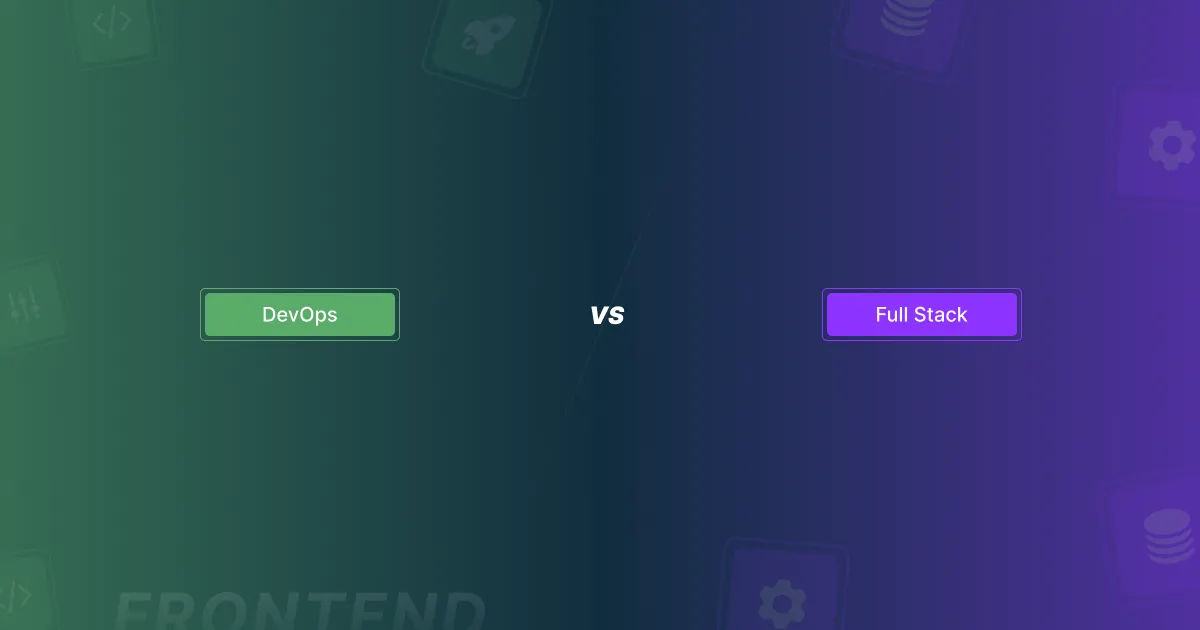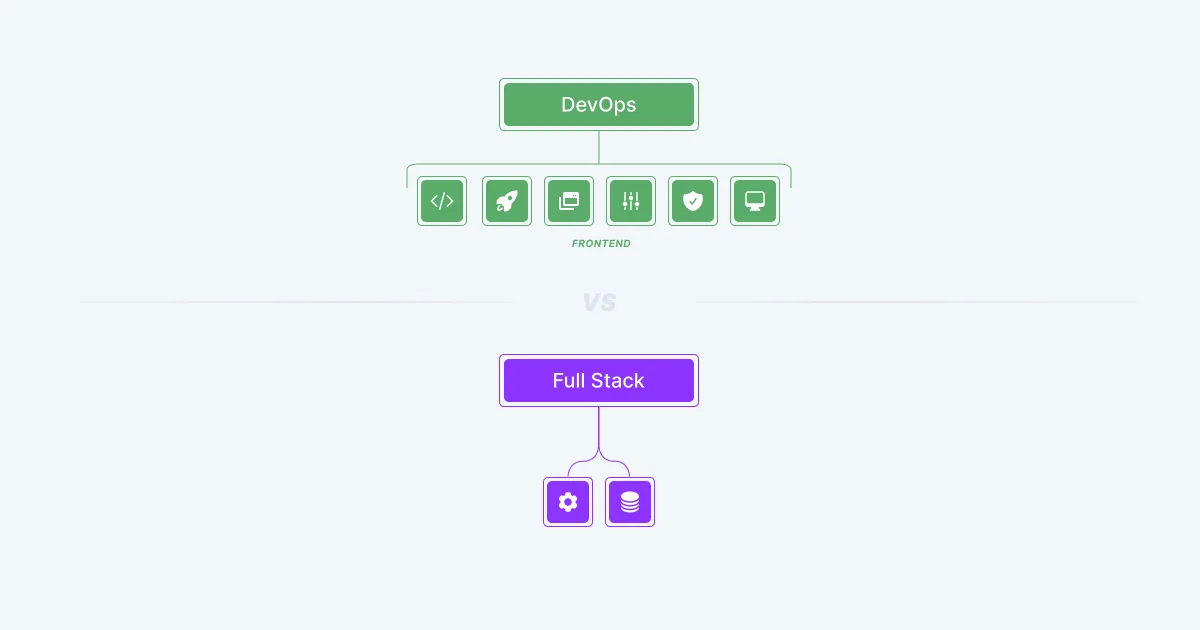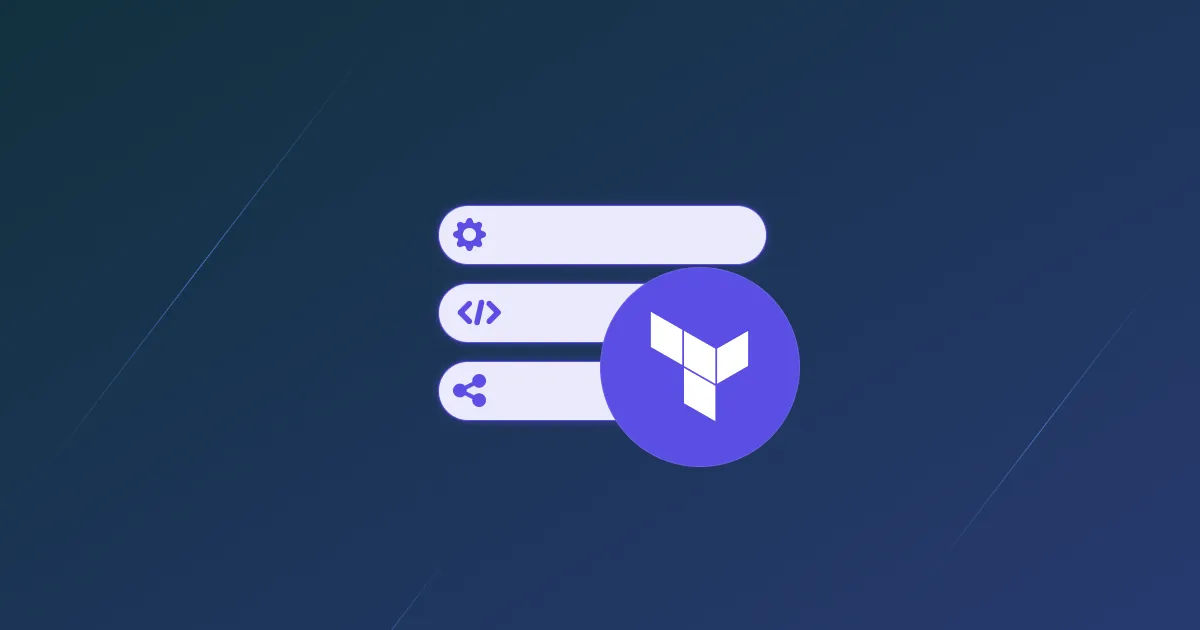DevOps vs Full Stack: What’s the Difference and Why It Matters

The tech industry has become very complex over the years. The rapid release of products created new job positions that need to be filled. Among them are the responsible positions of Full Stack Developers and DevOps Engineers, both essential in modern software delivery. However, their responsibilities, required skills, and career prospects differ significantly.
Since many people often confuse these two roles, it's crucial to understand the differences between them. Join our DevOps vs Full Stack debate, and we will answer the most common questions about these positions.
What are DevOps Engineers?
DevOps engineers bridge the gap between development and operations. Their main goal is to automate processes, manage infrastructure, and make sure that software applications run efficiently and reliably. These IT specialists manage complete product development and deployment operations, possessing expertise in coding and scripting.
The key responsibilities of DevOps Engineers include the following:
- Automating code testing, deployment, and infrastructure provisioning
- Monitoring application performance and responding to incidents
- Collaborating with developers and IT teams to streamline workflows
- Ensuring security, scalability, and cost-efficiency in cloud environments
DevOps Engineers work with tools like Jenkins, Docker, Kubernetes, and cloud platforms such as AWS or Azure to deploy, monitor, and scale applications seamlessly. Additionally, Microtica's AI-powered platform helps DevOps teams automate infrastructure setups, monitor performance, and control cloud costs. This process makes these complex tasks much simpler.
What is a Full Stack Developer?
Full Stack Developers are versatile professionals who handle both the front-end and back-end of applications. Designing the user interface and building the server-side logic are part of the overall web development process that developers have to handle.
The key responsibilities of Full Stack Developers include the following:
- Building and maintaining user interfaces and APIs
- Managing databases and server infrastructure
- Collaborating with designers, product managers, and other developers
- Ensuring a seamless user experience from end to end
- Meeting consumer and technical requirements
Full Stack Developers are valued for their ability to see the big picture and contribute to every stage of the software development lifecycle. They design, code, test, and deliver complete software solutions, often working with frameworks like React, Angular, Node.js, and Django.

Key Differences of DevOps vs Full Stack
To better understand the key differences between the two roles, here is a comparison of DevOps vs Full Stack roles and responsibilities.
The tech industry has become very complex over the years. The rapid release of products created new job positions that need to be filled. Among them are the responsible positions of Full Stack Developers and DevOps Engineers, both essential in modern software delivery. However, their responsibilities, required skills, and career prospects differ significantly.
Since many people often confuse these two roles, it's crucial to understand the differences between them. Join our DevOps vs Full Stack debate, and we will answer the most common questions about these positions.
What are DevOps Engineers?
DevOps engineers bridge the gap between development and operations. Their main goal is to automate processes, manage infrastructure, and make sure that software applications run efficiently and reliably. These IT specialists manage complete product development and deployment operations, possessing expertise in coding and scripting.
The key responsibilities of DevOps Engineers include the following:
- Automating code testing, deployment, and infrastructure provisioning
- Monitoring application performance and responding to incidents
- Collaborating with developers and IT teams to streamline workflows
- Ensuring security, scalability, and cost-efficiency in cloud environments
DevOps Engineers work with tools like Jenkins, Docker, Kubernetes, and cloud platforms such as AWS or Azure to deploy, monitor, and scale applications seamlessly. Additionally, Microtica's AI-powered platform helps DevOps teams automate infrastructure setups, monitor performance, and control cloud costs. This process makes these complex tasks much simpler.
What is a Full Stack Developer?
Full Stack Developers are versatile professionals who handle both the front-end and back-end of applications. Designing the user interface and building the server-side logic are part of the overall web development process that developers have to handle.
The key responsibilities of Full Stack Developers include the following:
- Building and maintaining user interfaces and APIs
- Managing databases and server infrastructure
- Collaborating with designers, product managers, and other developers
- Ensuring a seamless user experience from end to end
- Meeting consumer and technical requirements
Full Stack Developers are valued for their ability to see the big picture and contribute to every stage of the software development lifecycle. They design, code, test, and deliver complete software solutions, often working with frameworks like React, Angular, Node.js, and Django.
Key Differences of DevOps vs Full Stack
To better understand the key differences between the two roles, here is a comparison of DevOps vs Full Stack roles and responsibilities.
Which Is Better: DevOps or Full Stack Developer?
There is no definitive answer to whether DevOps is better than Full Stack. It all comes down to interests, career goals, and the needs of a certain project or team. Both these roles are significant in the software development industry.
The DevOps Engineer role is desirable for those who enjoy automating processes and managing cloud infrastructure. It involves working on large-scale and highly available systems. When deciding, keep in mind that DevOps collaborates across development and operations teams; they don't operate in solitude.
On the other side of the DevOps vs Full Stack comparison, Full Stack Developers prefer a more generalist role with a broad range of responsibilities. Those who enjoy building complete applications from scratch will surely find themselves in this position. At the same time, this role requires working on both front-end and back-end technologies.
Therefore, neither role is objectively better. It's more about finding the right fit for the skills and ambitions. In fact, many teams benefit from professionals who have experience in both areas. Microtica is one such platform designed to empower these hybrid roles by automating infrastructure and streamlining app delivery.
Hybrid Skills: Can You Do Both?
The line between DevOps and full-stack roles is increasingly blurred. Developers who understand practices such as CI/CD, containerization, and cloud deployments are highly sought after. On the other hand, Full Stack Developers who learn DevOps can write better, more reliable code and ship features faster.
Learning both skills surely makes candidates more valuable as team members and prepares them for leadership roles in the tech industry. Another benefit is that it increases their job prospects and earning potential.
How Microtica Helps Teams Excel at DevOps and Full Stack
Microtica is a platform designed with modern teams and individuals in mind who want to bridge the gap between DevOps and full-stack roles. It's an AI-powered cloud delivery tool that lets candidates focus on building and deploying applications efficiently by automating infrastructure and cloud setup, regardless of their primary role. Startups, scaling businesses, DevOps teams, and enterprises can explore Microtica’s platform features and see how it can transform their workflow.
Final Thoughts
Both DevOps and Full Stack are crucial components of modern software development, offering distinct advantages. Deciding between the two is not about choosing the “better” role, but about aligning interests, skills, and career goals. Both paths offer exciting opportunities, substantial salaries, and the chance to make a meaningful impact in the tech industry.
The DevOps vs Full Stack decision should be based on project specifications, organizational needs, and personal professional objectives. Choosing the hybrid option can also open up doors to a very promising future.
Which Is Better: DevOps or Full Stack Developer?
There is no definitive answer to whether DevOps is better than Full Stack. It all comes down to interests, career goals, and the needs of a certain project or team. Both these roles are significant in the software development industry.
The DevOps Engineer role is desirable for those who enjoy automating processes and managing cloud infrastructure. It involves working on large-scale and highly available systems. When deciding, keep in mind that DevOps collaborates across development and operations teams; they don't operate in solitude.
On the other side of the DevOps vs Full Stack comparison, Full Stack Developers prefer a more generalist role with a broad range of responsibilities. Those who enjoy building complete applications from scratch will surely find themselves in this position. At the same time, this role requires working on both front-end and back-end technologies.
Therefore, neither role is objectively better. It's more about finding the right fit for the skills and ambitions. In fact, many teams benefit from professionals who have experience in both areas. Microtica is one such platform designed to empower these hybrid roles by automating infrastructure and streamlining app delivery.
Hybrid Skills: Can You Do Both?
The line between DevOps and full-stack roles is increasingly blurred. Developers who understand practices such as CI/CD, containerization, and cloud deployments are highly sought after. On the other hand, Full Stack Developers who learn DevOps can write better, more reliable code and ship features faster.
Learning both skills surely makes candidates more valuable as team members and prepares them for leadership roles in the tech industry. Another benefit is that it increases their job prospects and earning potential.
How Microtica Helps Teams Excel at DevOps and Full Stack
Microtica is a platform designed with modern teams and individuals in mind who want to bridge the gap between DevOps and full-stack roles. It's an AI-powered cloud delivery tool that lets candidates focus on building and deploying applications efficiently by automating infrastructure and cloud setup, regardless of their primary role. Startups, scaling businesses, DevOps teams, and enterprises can explore Microtica’s platform features and see how it can transform their workflow.
Final Thoughts
Both DevOps and Full Stack are crucial components of modern software development, offering distinct advantages. Deciding between the two is not about choosing the “better” role, but about aligning interests, skills, and career goals. Both paths offer exciting opportunities, substantial salaries, and the chance to make a meaningful impact in the tech industry.
The DevOps vs Full Stack decision should be based on project specifications, organizational needs, and personal professional objectives. Choosing the hybrid option can also open up doors to a very promising future.
Subscribe to receive the latest blog posts to your inbox every week.
*By subscribing you agree to with our Privacy Policy.

Relevant Posts



